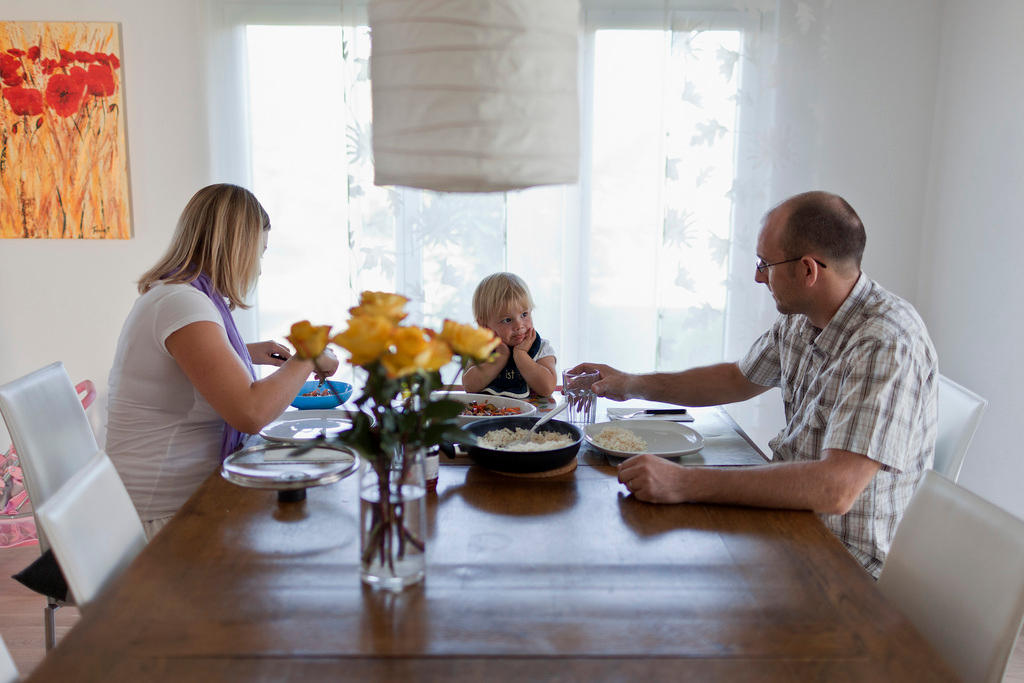Swiss kids still prefer outside play to smartphones

Although nearly one in two Swiss primary school kids owns a smartphone, their favourite activities remain playing outside, sports and meeting friends, says a nationwide survey. They also spend half the time on gaming and watching television as their counterparts in the United Kingdom.
Around 90% of children in Switzerland played inside or outside at least once a week in 2017, while 84% did sports and 80% met friends, according to the latest MIKE (Medien, Interaktion, Kinder, Eltern) digital media survey External linkof over 1,000 children aged six to 13, as well as over 600 parents.
“Children really like being with other children, so classical activities like going outside and meeting friends still can’t be topped,” said study co-author Gregor WallerExternal link, from the media psychology section of the Zurich University of Applied Sciences.
Television was the first media form to appear on the list of Swiss kids’ favourite pastimes, above using a mobile phone.
But when ranking only digital media tools, children said the mobile phone was their favourite. They used the device to play games, watch online videos, listen to music and send or receive messages.
Around 50% of primary school-age children possess a device of their own. Many also don’t own a game console, Waller said.
“Most parents in Switzerland are keeping an eye on this and are gently introducing children to digital media,” he observed.
Usage changes with age, background
But mobile phone usage changes with age. By the end of primary school, at age 11 or 12, 80% of children in Switzerland have a mobile or smartphone of their own.
“You then pretty much have the internet in your pocket, so internet, Whatsapp and YouTube usage all increase,” Waller said. “By the time children move on to secondary school, almost 100% have a smartphone.”
The survey, published earlier this month, found that children from a migration background were more likely to own a mobile phone or other such device. There are several theories as to why.
Waller said that parents of children whose families came to Switzerland from elsewhere tend to work more and therefore may find having a mobile phone important for communicating with their child.
“Another [theory] is that children with a migration background use the internet to keep in contact with friends and family in their country of origin,” he added.
International comparison
How do Swiss youth media habits stack up internationally? Neighbouring Germany has a similar digital media and kids survey, called KIMExternal link, as does the communications watchdog, Ofcom, in theExternal link UKExternal link (although it asks slightly different questions to the German and Swiss versions).
All three surveys showed a difference between the sexes, Waller said. Girls in Switzerland, Germany and the UK tend to read and listen to music more as well as play fewer video games than boys.
Smartphone ownership at primary school age was around the same in all the countries, at around 50%. Other shared trends were the popularity of tablets, watching TV, and YouTube.
Glued to the TV
But Waller was surprised at the difference in media usage times, such as how many hours per week children spent watching television and gaming.
Swiss parents said their children watched 5.5 hours of TV a week, while in the UK it amounted to 13.5 hours a week – more than double. For video games, Swiss parents said three hours, while their British counterparts reported seven hours.
The conclusion to be drawn is that children in Switzerland watch TV or play video games as many times per week as British youngsters, but Swiss-based parents pay careful attention to how much time is spent on these devices, said Waller.
Overall, the MIKE survey recommended that parents in Switzerland set clear rules on digital media usage for kids. They should also follow through on implementing those rules and consider their own behaviour.
“How can a child learn to use digital media responsibly and in a measured way if Mum and Dad are always looking at their phones, being a negative role model?” Waller asked. “This is very important, because the survey showed that parental and child media usage is closely linked.”

In compliance with the JTI standards
More: SWI swissinfo.ch certified by the Journalism Trust Initiative





You can find an overview of ongoing debates with our journalists here. Please join us!
If you want to start a conversation about a topic raised in this article or want to report factual errors, email us at english@swissinfo.ch.